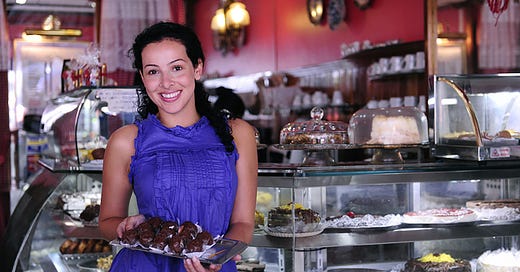No, Denver Post, Businessmen Should Never “Put Moral Judgments Aside”
By Ari Armstrong

After Colorado bureaucrats ruled that government may punish a professional cake baker for refusing to bake wedding cakes for gay couples, the Denver Post editorialized, “If you invite the public to patronize your cake shop, you have to be prepared to put moral judgments aside and serve all those who walk through your doors.”
The Post is wrong. To rationally operate their businesses in the pursuit of profit, producers must exercise moral judgment in every aspect of their operations, including the crucial matter of deciding whom to work for and whom to serve. To the degree that producers “have to” act against their moral judgments in some way, that is only because government forces them to do so, thereby violating their rights to operate their businesses according to their own judgment.
It is absurd to suggest, as the Post does, that opening one’s business to the general public somehow obligates one to serve every individual who walks through the doors, regardless of context. Must a cake baker bake a “God Hates Fags” cake for the bigoted Westboro Baptist Church, or a swastika cake for a neo-Nazi group? Must a restaurant manager ignore his moral judgments and serve every drunken, unruly lout who walks through the doors? Must the Denver Post publish “all those” op-ed submissions that come through its doors, regardless of how poorly written, absurd, or ideologically corrupt they are? Obviously not.
Of course there is a big difference between immorally discriminating against a gay couple (as the baker in question did) and morally discriminating against the Westboro Baptist Church. The fact that individuals have a moral right to act according to their own judgment (so long as they do not violate the rights of others by initiating physical force or by committing fraud) does not mean that their moral judgments will always be correct.
At issue is not the fact that the Colorado baker was wrong to discriminate against a gay couple, but the fact that the baker has a moral right to operate his business as he sees fit, and the government has no moral right to punish him for doing so. It is worth pointing out here that when government can forcibly stop producers from acting on their objectively wrong moral judgments, it can—and inevitably will—forcibly stop them from acting on their objectively correct moral judgments.
Contrary to the Denver Post’s absurd remarks, every aspect of a rational producer’s efforts is governed by his moral judgments. When a rational business owner starts a business and decides to enter a particular field, he does so based on his moral judgment that the pursuit is the best way for him to foster his life and happiness. When a rational business owner hires an employee, he does so based on his moral judgment that the employee is a good person suited to the job. When a rational business owner decides to do business with someone, he does so based on his moral judgment that the exchange will prove to be mutually beneficial, and based on his assumption that he is not aiding an immoral cause.
As for producers who act on irrational rather than rational judgments, so long as they do not thereby initiate force, they are no threat to anyone, and they will suffer in a free market to the degree of their irrationality. Just as a business owner has a moral right to decline to do business with someone, so a customer has a moral right to decline to seek out a business’s goods or services (for example, people have a moral right to boycott bigoted businesses). And rational producers, seeing an opportunity to make a profit, will rush to earn the business that might otherwise go to irrational competitors.
Neither producers nor consumers should ever “put moral judgments aside,” as the Denver Post urges; rather, they should seek to act always by their rational, moral judgments. As for government, it has no legitimate business punishing a producer, whether rational or irrational, unless he has somehow violated rights.



